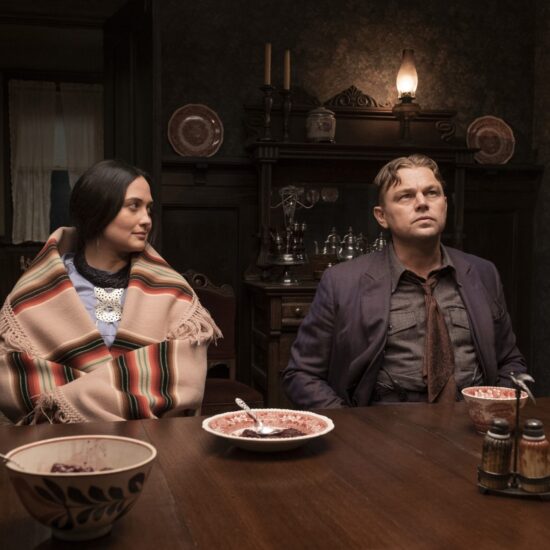
LENOX, Mass. — The problem with “Lessons in Love and Violence” has always been that it is not “Written on Skin.”
“Skin,” George Benjamin’s unflinchingly savage second opera with the librettist Martin Crimp, was hailed as a landmark at its premiere at the Aix-en-Provence Festival in 2012. Its stature has only grown since, and it’s a routine choice as one of the great operas of the century so far.
Benjamin and Crimp stuck to their template for the gruesome “Lessons,” the successor piece that was more coolly received after its debut in London in 2018 and that received its American premiere on Monday night at Ozawa Hall here, with the composer leading the youngsters of the Tanglewood Music Center Orchestra in dagger-sharp support of an incisive cast of current and past Tanglewood vocal fellows.
Like “Skin,” “Lessons” has a dense, historically contrived libretto, offering a callous plot that hacks away at any sentimentality you might have left about power or love. There is music that seethes and soothes — its every last, creepy twang of a cimbalom or bludgeon of brass conceived and executed with flawless clarity of gesture and precision of timbre.
Yet somehow this jewel-studded, velvet-wrapped mace of a score never once feels too deliberately methodical or sounds anything but fully alive. Its imposing rigor scalds in the heat of the murderous moment.
Listen to it, and you might ask yourself which of these two unsparing operas is supposed to be Benjamin’s masterpiece. For if “Skin” disappeared, “Lessons” would be sufficient to anoint its composer all on its own.
The operas are similar, but “Lessons” is no mere reproduction of its predecessor. It abandons the metahistorical flourishes of the earlier work, focusing on the story at hand rather than creating a superstructure of characters to drag it into the present. Despite the medieval setting, the core conceit of a prince receiving (dubious, shall we say) instruction in governance from the machinations of his parents — the King and his wife, Isabel — and their scheming courtier-lovers, Gaveston and Mortimer, has a Machiavellian timelessness to it.
“Don’t bore me with the price of bread,” the King sings when Mortimer confronts him with the ruin that his favor for Gaveston has unleashed on the body politic. “There is no connection between our music and your labor,” Isabel assures the impoverished supplicants who demand an end to entertainments whose costs could pay their wages for a year. Not for nothing did the concert performance here, instinctively acted behind music stands though it was, take on the morality tale feel of an oratorio.
However revealing the unstaged approach might be, it’s regrettable that “Lessons” had its premiere like this. How is it possible, one has to ask, that the first American performance of such a major work should be entrusted to a group of summer-school attendees for one sparsely attended night only — a Monday, no less — in the Berkshires?
The Lyric Opera of Chicago is one of seven co-commissioners of “Lessons,” but there is still no sign of it mounting Katie Mitchell’s original staging, which it had to postpone in 2020. In the absence of a major house taking up “Skin,” the Mostly Mozart Festival in New York, at its bravest, gave that work its staged premiere in 2015, but that festival is no more.
It is to Tanglewood’s immense credit that it has taken the initiative, pushing its fellows to their limit at the end of the annual Festival of Contemporary Music and building on the long, close relationship that the Boston Symphony Orchestra has enjoyed with Benjamin, who led “Skin” in its quickly mounted American debut here in 2013 and followed it with a song cycle, “Dream of the Song,” in 2016.
And you would be glad, though gladdening this opera is not, to hear a performance as strong as Monday’s in any major house. Three of the main parts were taken by recent graduates of Tanglewood’s vocal program; greater testament to its worth would be hard to imagine. Nathaniel Sullivan sang the King — Edward II, as imagined by Christopher Marlowe then reimagined by Crimp — with sniveling command, the monarch’s weakness to the fore. Daniel McGrew was eerily believable portraying the soldier-technocrat Mortimer’s earnest association of orderly progress with the necessity of killing, while Dominik Belavy gave Gaveston a deliciously unhinged air.
Surely no soprano takes on a role written for Barbara Hannigan without fear, but the current Tanglewood fellow Elizabeth Polese made it seem as if she had as the haughty Isabel. She excelled just as Edmond Rodriguez brought frightening dignity to the Boy who learns his lessons all too well, chillingly scheduling the execution of Mortimer after the general has installed him on the throne. Meredith Wohlgemuth, Claire McCahan and Jack Canfield acquitted themselves well in smaller roles.
But the orchestra was the star. Benjamin conducted it with his customary, graceful efficiency. Short of Alban Berg, few composers have been able to make abject brutality sound so exquisite, even so tender as Benjamin does here, his use of silence as intentional as his careful etching of textures around the voices.
There is an unerring flow to “Lessons”: Several of its seven short scenes echo one another; interludes link them, commenting on and even extending the action; and the odd leitmotif pokes through, most noticeably the braying trombones that announce the King and that reappear, with mutes, when his son assumes the throne.
Yet it is Benjamin’s merciless ability to hunt down the most specific of sounds that makes him such a potent dramatist. A desperately longing solo horn, fraught with desire, plays as Gaveston relates how the King likes to hold his hand over a flame; pawing woodwinds surround a Madman who fatally insists to the Boy that he is the real king, based on testimony from a cat.
Gaveston gets the grisliest death of all, nothing like the horrifying tower of dissonance that accompanies the killing of the King, but one that we have to imagine in absentia, as the powerless ruler reads the details of his lover’s death from a letter while a percussionist taps out a rhythm on the rim of a side drum.
You might hear in that the loneliness of Gaveston, or the dread of a King confronting the passage of time before his own, sure murder. I heard cockroaches, scurrying around the dead. Either way, what in any other composer’s hands could be predictable, Benjamin makes magical.
Lessons in Love and Violence
Performed on Monday at Ozawa Hall at Tanglewood in Lenox, Mass.













